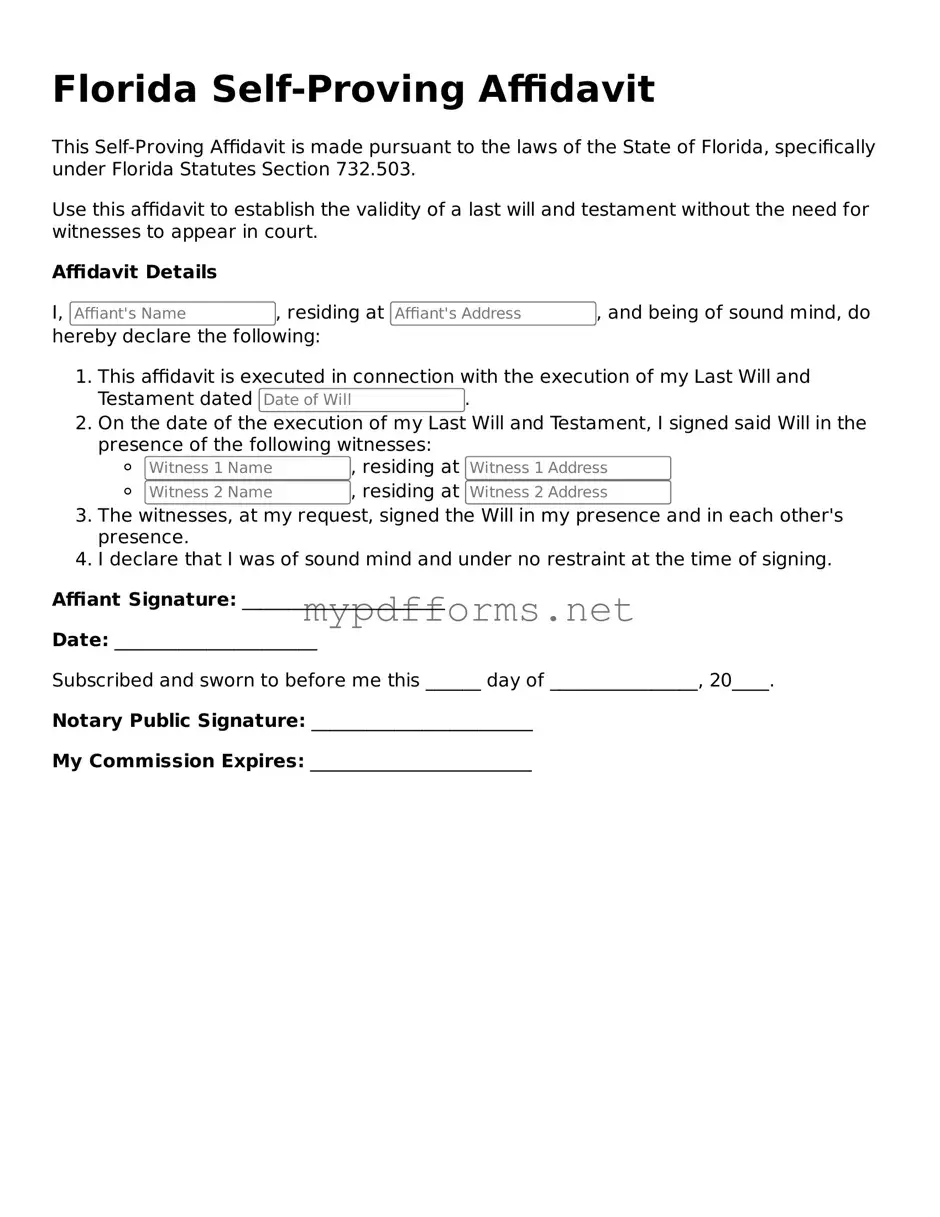The Florida Self-Proving Affidavit is similar to the Affidavit of Execution, which is used to confirm that a will was properly executed. This document is signed by witnesses who affirm that they observed the testator sign the will. Both documents serve to validate the will's authenticity and ensure that it meets legal standards. However, the Self-Proving Affidavit also includes a statement that allows the will to be accepted in probate court without requiring witnesses to testify, streamlining the process.
Another document akin to the Self-Proving Affidavit is the Will Declaration. This document outlines the testator's wishes regarding asset distribution upon their death. While the Will Declaration does not include the same notarization and witness requirements as the Self-Proving Affidavit, both documents aim to provide clarity on the testator's intentions. The Self-Proving Affidavit enhances the Will Declaration by adding a layer of verification that can expedite probate proceedings.
The Durable Power of Attorney shares similarities with the Self-Proving Affidavit in that both documents require signatures and witnesses to be legally binding. The Durable Power of Attorney allows an individual to designate someone to make decisions on their behalf, especially in financial matters. While the Self-Proving Affidavit focuses on the validity of a will, both documents serve important roles in ensuring that an individual’s wishes are respected and carried out.
The Living Will is another document that parallels the Self-Proving Affidavit. A Living Will outlines an individual's preferences for medical treatment in the event they cannot communicate their wishes. Like the Self-Proving Affidavit, it often requires signatures and may need witnesses or notarization to be enforceable. Both documents reflect personal choices and help avoid confusion during critical times.
The Revocable Trust Agreement is similar in function to the Self-Proving Affidavit as it establishes how an individual’s assets will be managed and distributed. This agreement can be amended or revoked during the grantor's lifetime. While the Self-Proving Affidavit is specifically for wills, both documents aim to provide clarity and ensure that the grantor’s wishes are honored, especially in estate planning.
The Certificate of Trust is another related document. It verifies the existence of a trust and outlines its terms without revealing the entire trust document. Similar to the Self-Proving Affidavit, it can facilitate the management of assets and ensure that the trust is recognized by third parties. Both documents serve to confirm the legitimacy of the testator's or grantor's intentions regarding asset distribution.
In situations where property ownership must be transferred without the complexities of title guarantees, utilizing a Quitclaim Deed is essential. This straightforward legal document, akin to others like the Release of Liability form, aids in simplifying the process, making it particularly useful among family members or during divorce proceedings. To begin the process, interested parties can access the fillable Quitclaim Deed form at https://quitclaimdocs.com/fillable-north-carolina-quitclaim-deed/, ensuring clarity and intent in the transfer of real estate assets.
The Affidavit of Heirship is similar in that it helps establish the rightful heirs to a deceased person's estate. This document is often used when there is no will. Like the Self-Proving Affidavit, it serves to clarify the distribution of assets and can expedite the probate process. However, the Self-Proving Affidavit provides a more formalized approach by ensuring that a will is recognized without the need for additional witness testimony.
The Codicil is another document that relates to the Self-Proving Affidavit. A Codicil is an amendment to an existing will, allowing the testator to make changes without drafting an entirely new document. Both documents require signatures and may need to be witnessed or notarized. The Self-Proving Affidavit can be attached to a Codicil to simplify the probate process and confirm the validity of the amended will.
Finally, the Affidavit of Testimony is similar in that it provides evidence of a person's statements regarding a will or estate. This document can be used to support claims made during probate proceedings. Like the Self-Proving Affidavit, it is designed to establish the validity of a will and clarify the testator's intentions. Both documents help reduce disputes and streamline the probate process by providing clear evidence of the testator's wishes.

